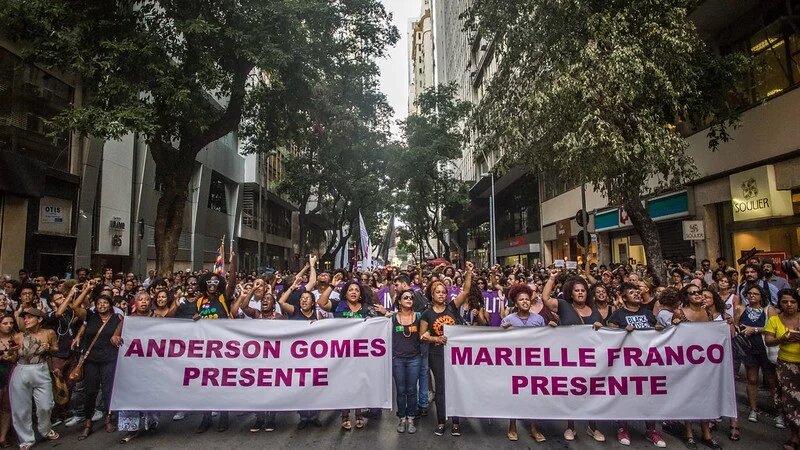The murder of Marielle Franco reveals the interdependencies between the Brazilian political system and organized crime. In the Interview with sociologist Daniel Hirata we find out more about the militias in Rio de Janeiro and their links to the government.

Briefly after the March 2024 arrest of the alleged perpetrators of the murder of Rio de Janeiro City Councilor Marielle Franco and her driver Anderson Gomes, we spoke to sociologist Daniel Hirata about the spread of militias in Rio de Janeiro and how the murder case unearths the links between the state and the militia.
Hirata is a lecturer and coordinator of the GENI research group (Grupo de Estudos dos Novos Ilegalismos) at the Universidade Federal Fluminense. The Heinrich Böll Foundation is supporting GENI and the Instituto Fogo Cruzado in the mapping of armed groups, which shows the expansion of the militias' areas of power by 387 percent in the Rio de Janeiro metropolitan region between 2006 and 2021.
The Marielle Franco murder case received much national and international attention as an example of the great influence of criminal actors on public figures and members of parliament. Elected officials use political violence to the benefit of criminal gangs. The investigation of the case provides insights into how the political system works hand-in-hand with organized crime. The example also shows that civil rights and even human life are not respected as they should be in Rio de Janeiro’s urban politics.
Briefly after the March 2024 arrest of the alleged perpetrators of the murder of Rio de Janeiro City Councilor Marielle Franco and her driver Anderson Gomes, we spoke to sociologist Daniel Hirata about the spread of militias in Rio de Janeiro and how the murder case unearths the links between the state and the militia.
Hirata is a lecturer and coordinator of the GENI research group (Grupo de Estudos dos Novos Ilegalismos) at the Universidade Federal Fluminense. The Heinrich Böll Foundation is supporting GENI and the Instituto Fogo Cruzado in the mapping of armed groups, which shows the expansion of the militias' areas of power by 387 percent in the Rio de Janeiro metropolitan region between 2006 and 2021.
The Marielle Franco murder case received much national and international attention as an example of the great influence of criminal actors on public figures and members of parliament. Elected officials use political violence to the benefit of criminal gangs. The investigation of the case provides insights into how the political system works hand-in-hand with organized crime. The example also shows that civil rights and even human life are not respected as they should be in Rio de Janeiro’s urban politics.
It took six years for the alleged masterminds of the murder of Marielle Franco and Anderson Gomes to be arrested: Federal Deputy Chiquinho Brazão; member of the Rio de Janeiro Court of Auditors (TCERJ) Domingos Brazão; and the former head of Rio de Janeiro's civil police, Rivaldo Barbosa. What does this tell us about the political system in Brazil and its relationship with the armed groups?
Daniel Hirata: The investigations of the Marielle case were divided into two phases, both of which played an important role in uncovering the interplay between the political and criminal systems in Rio de Janeiro. In 2019, the people who carried out the crime were identified. A whole series of important but unknown names were made public. These were people linked to the militias, paramilitary groups and the jogo do bicho, an illegal, animal-themed lottery game. In 2024, something even more important came to light, namely the involvement of members of state institutions in the case. These included a city councilor (at municipal level), a federal deputy and a member of the Rio de Janeiro Court of Auditors, one of the most important control and monitoring bodies in the state, as well as representatives of the police: high-ranking representatives of the Rio de Janeiro Civil Police, which is important to emphasize.
So we are talking here about much better organized structures than the drug trafficking cartels ever had
We can therefore say that this is an emblematic example of how the political system works with organized crime. These political representatives were in favor of legislative proposals to loosen land-ownership regulations, benefiting these armed groups. The entire system of control and surveillance was corrupted by political appointments that were also made in favor of these groups. In fact, we are talking about much better organized structures than the drug trafficking cartels ever had. The latter have always been considered the main enemy of public security.
The mapping of armed groups shows a 387 per cent increase in the number of militias in Rio de Janeiro between 2006 and 2021. What are the main reasons for this increase?
In my opinion, there are two structural reasons that explain this massive expansion of the militias—they represent the newest type of grouping in the criminal system of Rio de Janeiro. In the beginning, there was mainly the jogo do bicho. This is a historical phenomenon in Rio de Janeiro that has existed since the end of the 19th century. The drug gangs, on the other hand, are newer structures that emerged in the late 1970s to early 1980s and split in the 1990s. Militias did not emerge until the late 1990s and early 2000s. Although these are the newest groups, they exercise the greatest control in terms of area in the state of Rio de Janeiro.
Their growth is based upon two foundations. The first is their business model, predicated on their ‘production’ in the cities. The case of Marielle has made this very clear. Their most important market is the property market, for example through the occupation and subsequent illegal appropriation of land, through the construction, purchase, sale and rental of properties, through the management of residential buildings and everything else that the housing market entails. They provide all kinds of utilities and services: water, electricity, waste disposal, cooking gas and internet, all essential to life in the city. This business model of the militias has proven much more profitable than that of the cartels.
The emergence of actors from the upper echelons of institutions, as in the case of Marielle Franco, is nothing new.
The second basis is the political support of the groups or the actual co-opting of the political system, for example as police officers, political representatives and employees of state agencies at various levels. The emergence of actors from the upper echelons of institutions, as in the case of Marielle Franco, is nothing new. The militias operate in a network, which means that they are represented from the highest ranks of the bureaucracy down to the basic levels of public servant.
Research on the militias has shown that the representatives of the jogo do bicho are also active in areas under militia control. What is the difference between the two groups?
Rio de Janeiro is home to a particularly wide variety of criminal groups. The first form of more organized crime in Rio is the jogo do bicho. This is a kind of informal lottery that emerged at the end of the 19th century and was consolidated during the military dictatorship in particular. It is merely a misdemeanor, not a criminal offense. It has been widely documented that the Brazilian military dictatorship supported the development of the jogo do bicho structure. Functionaries from the dictatorship’s dungeons quickly became partners. They initially worked as security chiefs for the lottery operators and would eventually become militia members.
The jogo do bicho can also be seen as a mafia. Originally, these were organizations from a family context that were primarily based on the exchange of favors. The paramilitary groups that we call militias here in Rio de Janeiro emerged from these jogo do bicho organizations, as well as from the so-called death squads and extermination squads that are very common in some Latin American countries.
Drug gangs in Brazil have always been less organized and have their origins in Brazilian prisons. The largest cartel in Rio de Janeiro to this day originates from the prison on the island of Ilha Grande, which is located in the state of Rio de Janeiro to the west of the city of the same name. During the military dictatorship, a wide variety of people came together — from bank robbers to political prisoners. Due to the inhumane conditions that prevailed in this prison (as in all other Brazilian prisons), an internal support group was founded among the inmates, the Comando Vermelho. The group's activities initially focused on drug trafficking. When cocaine arrived in Brazil from Colombia in the late 1970s and early 1980s, the group expanded beyond the prisons. During the 1990s, 2000s and 2010s, the group split into the Terceiro Comando Puro and the Amigos dos Amigos, among others.
The aim of controlling territories by force of arms repeatedly leads to conflicts between the various groups. A large proportion of the violent deaths in the state of Rio de Janeiro can be attributed to these conflicts.
Hearing all this, everything seems to be lost—but what would be your recommendations for taking action against the armed gangs?
In my opinion, the militias in Rio de Janeiro must be confronted in three ways. These are also the three areas that the Marielle Franco case has revealed.
First, it is fundamental to regulate the gangs’ production base in the city. There is often an official presence, but there is no public, democratic regulation of these markets. By this I mean the markets that have already been mentioned as particularly relevant—mainly the property market, but also everything related to the urban infrastructure. This measure would be particularly effective because it takes away the economic base of the militias. It is also much less lethal than the large-scale police operations that constitute the usual public-security practice in Rio de Janeiro, which have been absolutely ineffective in confronting organized crime. The report sponsored by the Heinrich Böll Foundation has also shown that these police operations are often instrumentalized in favor of the militias. Furthermore, far more police operations are carried out against drug trafficking than against the militias. Apart from inefficiency, the brutal behavior of the police is also part of their corruption problem.
Second, the democratic control of police work. Brazilian police forces in general, and especially those of the state of Rio de Janeiro, do not act in accordance with democratic institutions. Internal controls are characterized by ‘favors’ among colleagues and external controls are unfortunately weak. The public prosecutor's office, which is constitutionally in charge of this task, does not fulfill its role at all.
Without cutting the criminal dynamic off from the political system, no regulatory measures can be taken.
Third, the links to the political system must be cut. This also seems to me to be a prerequisite for the other two measures, because without cutting the criminal dynamic off from the political system, no regulatory measures can be taken and no democratic control of police work can be implemented. This is perhaps the most difficult task to solve. After all, our political system has been characterized by a high degree of cronyism for many years and has become strongly allied with crime in recent decades. This is also a major challenge for the political culture. The Brazão family, which is directly involved in the Marielle Franco case, was first elected in the municipal elections in 1996 and is now represented by six family members at different levels: federal, state and municipal. It is by no means an unimportant, unknown or even new family: it is an integral part of Rio de Janeiro's political system.
The questions were asked by Marilene de Paula and Manoela Vianna.
This Interview was translated from German by Luca Basile.



